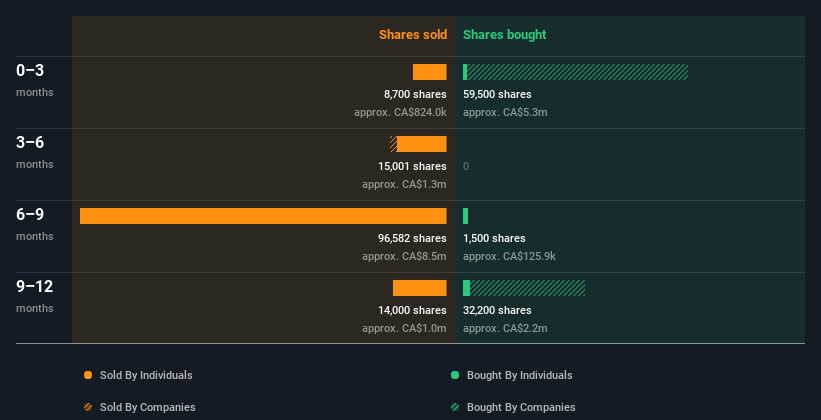Possible Bearish Signals With EQB Insiders Disposing Stock
Many EQB Inc. (TSE:EQB) insiders ditched their stock over the past year, which may be of interest to the company's shareholders. When evaluating insider transactions, knowing whether insiders are buying is usually more beneficial than knowing whether they are selling, as the latter can be open to many interpretations. However, shareholders should take a deeper look if several insiders are selling stock over a specific time period.
Although we don't think shareholders should simply follow insider transactions, we do think it is perfectly logical to keep tabs on what insiders are doing.
View our latest analysis for EQB
The Last 12 Months Of Insider Transactions At EQB
The President, Andrew R. Moor, made the biggest insider sale in the last 12 months. That single transaction was for CA$2.5m worth of shares at a price of CA$81.09 each. That means that an insider was selling shares at slightly below the current price (CA$95.38). As a general rule we consider it to be discouraging when insiders are selling below the current price, because it suggests they were happy with a lower valuation. While insider selling is not a positive sign, we can't be sure if it does mean insiders think the shares are fully valued, so it's only a weak sign. It is worth noting that this sale was only 5.3% of Andrew R. Moor's holding. Notably Andrew R. Moor was also the biggest buyer, having purchased CA$368k worth of shares.
Over the last year, we can see that insiders have bought 4.60k shares worth CA$368k. On the other hand they divested 132.28k shares, for CA$11m. Over the last year we saw more insider selling of EQB shares, than buying. The average sell price was around CA$84.88. We don't gain confidence from insider selling below the recent share price. Of course, the sales could be motivated for a multitude of reasons, so we shouldn't jump to conclusions. You can see a visual depiction of insider transactions (by companies and individuals) over the last 12 months, below. If you click on the chart, you can see all the individual transactions, including the share price, individual, and the date!

I will like EQB better if I see some big insider buys. While we wait, check out this free list of undervalued and small cap stocks with considerable, recent, insider buying.
EQB Insiders Are Selling The Stock
We've seen more insider selling than insider buying at EQB recently. We note President Andrew R. Moor cashed in CA$819k worth of shares. Meanwhile President Andrew R. Moor bought CA$100k worth. Because the selling vastly outweighs the buying, we'd say this is a somewhat bearish sign.
Insider Ownership
I like to look at how many shares insiders own in a company, to help inform my view of how aligned they are with insiders. I reckon it's a good sign if insiders own a significant number of shares in the company. It appears that EQB insiders own 1.7% of the company, worth about CA$62m. We've certainly seen higher levels of insider ownership elsewhere, but these holdings are enough to suggest alignment between insiders and the other shareholders.
What Might The Insider Transactions At EQB Tell Us?
The stark truth for EQB is that there has been more insider selling than insider buying in the last three months. And our longer term analysis of insider transactions didn't bring confidence, either. But since EQB is profitable and growing, we're not too worried by this. Insider ownership isn't particularly high, so this analysis makes us cautious about the company. We'd practice some caution before buying! So these insider transactions can help us build a thesis about the stock, but it's also worthwhile knowing the risks facing this company. At Simply Wall St, we found 1 warning sign for EQB that deserve your attention before buying any shares.
Of course EQB may not be the best stock to buy. So you may wish to see this free collection of high quality companies.
For the purposes of this article, insiders are those individuals who report their transactions to the relevant regulatory body. We currently account for open market transactions and private dispositions of direct interests only, but not derivative transactions or indirect interests.
Have feedback on this article? Concerned about the content? Get in touch with us directly. Alternatively, email editorial-team (at) simplywallst.com.
This article by Simply Wall St is general in nature. We provide commentary based on historical data and analyst forecasts only using an unbiased methodology and our articles are not intended to be financial advice. It does not constitute a recommendation to buy or sell any stock, and does not take account of your objectives, or your financial situation. We aim to bring you long-term focused analysis driven by fundamental data. Note that our analysis may not factor in the latest price-sensitive company announcements or qualitative material. Simply Wall St has no position in any stocks mentioned.
 Index Options
Index Options CME Group
CME Group Nasdaq
Nasdaq Cboe
Cboe TradingView
TradingView Wall Street Journal
Wall Street Journal